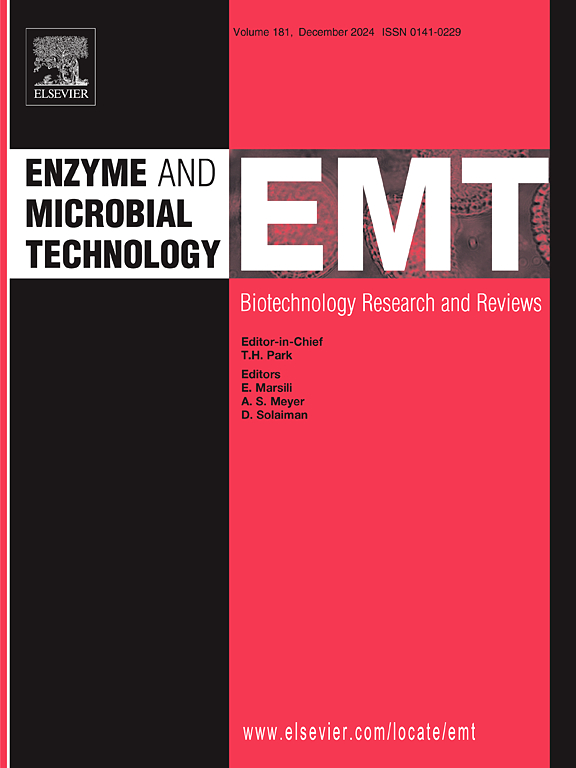Leveraging Se-nanoparticle@Candida tropicalis for efficient di-carboxylic acid production and methodological advances in selective product separation
IF 3.7
3区 生物学
Q2 BIOTECHNOLOGY & APPLIED MICROBIOLOGY
引用次数: 0
Abstract
This study investigates a bio-inorganic hybrid of selenium nanoparticles (SeNP@C. tropicalis) with an in-house developed mutant of Candida tropicalis (Castellani) Berkhout for enhanced bioconversion of crude dodecane (C₁₂H₂₆) into di-carboxylic acids (DCAs) under challenging conditions. The presence of SeNP@C. tropicalis improves NAD+ /NADH regeneration by enhancing enzymatic activity, thereby optimizing the metabolic transformation process. The activation of low-reactivity alkanes to DCAs, facilitated by cytochrome P450 monooxygenase, NADPH, and alcohol dehydrogenase (ADH), presents a sustainable approach for biorefineries when paired with effective downstream processing. At a 2 L scale, the SeNP@C. tropicalis hybrid achieved a 40.87 % increase in DCA production compared to the control. High-resolution transmission electron microscopy (HRTEM) confirmed the deposition of well-defined, spherical SeNP@C. tropicalis on the yeast surface, and X-ray diffraction (XRD) spectra validated the crystallinity of the nanoparticles, along with Confocal imaging. For downstream processing, four methods were evaluated, with vacuum distillation followed by crystallization achieving the highest DCA purity (>75 %) and recovery (>84 %). This research highlights the potential of SeNP@C. tropicalis as an effective catalyst for DCA production, offering new opportunities for advancing bioconversion technologies and enhancing the sustainability of biorefineries.
利用Se-nanoparticle@Candida热带草高效二羧酸生产和选择性产品分离的方法进步
本研究研究了硒纳米粒子的生物无机杂化(SeNP@C)。利用内部开发的热带假丝酵母(Castellani) Berkhout突变体,在具有挑战性的条件下增强粗十二烷(C₁₂H₂₆)向二羧酸(DCAs)的生物转化。SeNP@C的存在。热带草通过增强酶活性促进NAD+ /NADH再生,从而优化代谢转化过程。细胞色素P450单加氧酶、NADPH和乙醇脱氢酶(ADH)促进了低反应性烷烃对DCAs的活化,当与有效的下游加工相结合时,为生物炼制提供了一种可持续的方法。在2 L的比例下,SeNP@C。与对照相比,热带稻杂交种的DCA产量提高了40.87 %。高分辨率透射电子显微镜(HRTEM)证实了沉积明确的球形SeNP@C。通过共聚焦成像和x射线衍射(XRD)光谱验证了纳米颗粒的结晶度。对于下游加工,评估了四种方法,其中真空蒸馏后结晶可获得最高的DCA纯度(>75 %)和回收率(>84 %)。这项研究突出了SeNP@C的潜力。热带植物是DCA生产的有效催化剂,为推进生物转化技术和提高生物精炼厂的可持续性提供了新的机会。
本文章由计算机程序翻译,如有差异,请以英文原文为准。
求助全文
约1分钟内获得全文
求助全文
来源期刊

Enzyme and Microbial Technology
生物-生物工程与应用微生物
CiteScore
7.60
自引率
5.90%
发文量
142
审稿时长
38 days
期刊介绍:
Enzyme and Microbial Technology is an international, peer-reviewed journal publishing original research and reviews, of biotechnological significance and novelty, on basic and applied aspects of the science and technology of processes involving the use of enzymes, micro-organisms, animal cells and plant cells.
We especially encourage submissions on:
Biocatalysis and the use of Directed Evolution in Synthetic Biology and Biotechnology
Biotechnological Production of New Bioactive Molecules, Biomaterials, Biopharmaceuticals, and Biofuels
New Imaging Techniques and Biosensors, especially as applicable to Healthcare and Systems Biology
New Biotechnological Approaches in Genomics, Proteomics and Metabolomics
Metabolic Engineering, Biomolecular Engineering and Nanobiotechnology
Manuscripts which report isolation, purification, immobilization or utilization of organisms or enzymes which are already well-described in the literature are not suitable for publication in EMT, unless their primary purpose is to report significant new findings or approaches which are of broad biotechnological importance. Similarly, manuscripts which report optimization studies on well-established processes are inappropriate. EMT does not accept papers dealing with mathematical modeling unless they report significant, new experimental data.
 求助内容:
求助内容: 应助结果提醒方式:
应助结果提醒方式:


